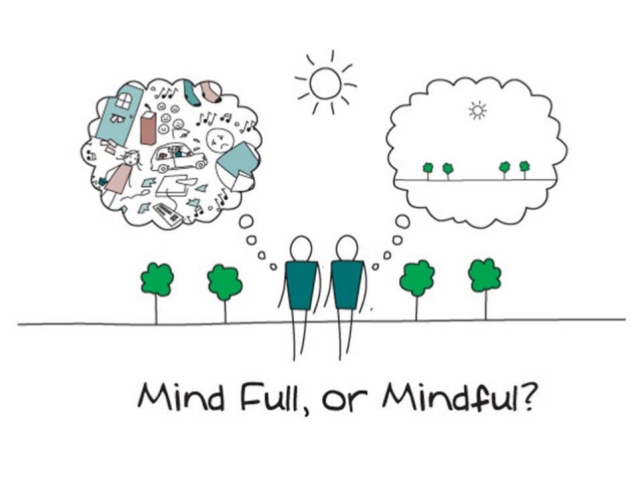Mind full or mindful?

date: 02/10/2015
Mindfulness – a way to manage stress and enhance well-being
Mindfulness means maintaining a real-time awareness of our thoughts, feelings, bodily sensations, and surrounding environment. It involves learning to direct our attention to our experience here and now, with curiosity and without judgement. Research seems to tell us that regular mindfulness practice can help to reduce stress levels, enhance concentration, memory and well-being. Today, secular practice of Mindfulness is present also in workplaces, schools and medical context where its physical, psychological and social benefits are noticed.
To help us all learn more about it, three colleagues from the institutions will share information, experience and a short practice at a SCIC lunchtime conference on 17 December:
- Tanguy Verraes (ERCEA) will present what research has discovered about mindfulness
- Diana Filoti (SCIC) will tell us why and how she practices and give an interpreter’s point of view
- Nathalie Legros (ERCEA) will lead us to a first-hand experience.
Tanguy Verraes, Scientific Adviser from European research Council, shares some of his thoughts before the lunchtime conference on 17 December:
Mindfulness is more visible than ever in the Commission and European institutions in general. What do you think is the reason for it?
From my very personal perspective, there is more interest in 'Mindfulness' among EC staff due to a combination of several factors such as:
- global companies like Google, Facebook, Apple and McKinsey have implemented 'Meditation' practice enhancing employees' participation and leading to a reduction in sick leave
- thousands of scientific studies carried out since the 1970s and mentioned in the media appear to demonstrate the health benefits of a regular meditation practice and of nurturing a 'mindful state of mind'
- media coverage and increasing interest for Buddhism (i.e. Zen, Tibetan Buddhism and others.)
- a growing interest in Eastern 'spiritual' disciplines (e.g. Yoga, Tai-chi and Qi-gong) and greater readiness to discuss 'spirituality’
- a feeling of dissatisfaction with the current economic and social model
- the EC internal Yammer Social Network helps to interact/discuss 'non-work related' topics informally and
- last but not least, a more stressful working environment for EC staff (at all levels).
What are European Commission’s involvement in and contribution to brain research from this perspective in a nutshell?
In the field of Neuroscience and Brain researches the European Commission launched in 2013 the ambitious project named "Human Brain Project" .The European Human Brain Project has formulated a vision in which interactivity will turn supercomputers into scientific instruments, enabling in silico experiments on virtual human brains. The pre-commercial procurement of research and development services for interactive supercomputers has entered its final stage as recently as a week ago. It is not linked to mindfulness, but those interested will find more information at https://www.humanbrainproject.eu/.
Apart from this, researchers, studies and projects related to Mindfulness have been mainly supported through the DG RTD's FP7 and Horizon2020 programmes.
Whom would you like to see among practitioners in the EU institutions?
Ideally, everyone. That said, in my humble opinion, practice is not that important as long as one is able to show leadership by developing insight and outsight capacities in a context of mutual-respect, at all hierarchical levels.
What does intentional awareness mean to you?
If I were to think of synonyms for 'Intentional awareness', they would be: Insight, clairvoyance and/or lucidity. If I had to come up with a quotation, it would be, without hesitation, the Greek Delphic motto "Know thyself / γνῶθι σεαυτόν".
Anything else you would like to say?
What follows is only my humble opinion and does not necessarily correspond to the general accepted opinion:
- If Sitting Meditation greatly contributes to nurturing Mindfulness, Mindfulness is also reachable by other practices than Sitting Meditation.
- Meditation practice should be considered thoroughly and may require medical/psychological assistance.
- Meditation is not a prerogative of 'Buddhism' and does exist in other religions and philosophies in many unexpected forms.
- A lot of misunderstandings/misconceptions about meditation stem from the fact that ZEN/SEON/CHAN meditation, which is the most popular in the West, is associated with concepts such as Vacuity, Emptiness, Calmness or Relaxation. This assumption is only true when one's practice is sufficiently advanced.
Jaana Peltonen, SCIC.S.1

